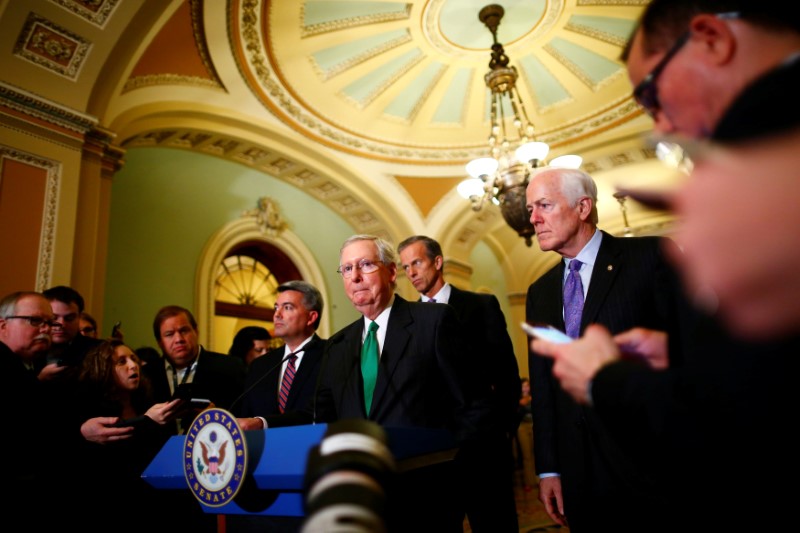By Doina Chiacu and Pete Schroeder
WASHINGTON (Reuters) - The top U.S. Senate Republican and the White House budget director said on Sunday they hoped for action on a Republican tax reform package by the end of the year, while keeping their options open on how to pay for sweeping tax cuts.
President Donald Trump's plan promises up to $6 trillion in tax cuts but would increase the federal deficit by $1.5 trillion over the next decade. Democrats have criticized the package as a giveaway to the rich and corporations that would balloon the deficit.
Republicans, who control both the Senate and House of Representatives, have yet to produce a bill as their self-imposed deadline to overhaul the U.S. tax code by the end of 2017 approaches. The party's lawmakers differ widely on what cuts to make and how to pay for them.
Trump participated in a conference call with House Republican lawmakers on Sunday where tax reform was discussed, a White House official said.
The president was also expected to travel to Capitol Hill on Tuesday to participate in Senate Republicans' weekly policy lunch, with the tax package high on the agenda.
The White House is not counting on Congress enacting enough spending reductions to offset the impact on revenue from tax cuts, said Trump's budget director, Mick Mulvaney.
"We hit off $54 billion worth of discretionary cuts in our budget back in March. Only about 4 or 5 billion (dollars) have survived so far on the Hill," Mulvaney said on CBS' "Face the Nation." "We're not going to be able to cut our way to balance."
Senate Majority Leader Mitch McConnell said estimated growth for the overall economy in the Republican plan would offset the tax cuts.
Asked on CNN's "State of the Union" whether he had abandoned his longtime insistence that tax cuts be revenue-neutral, McConnell said: "No, actually we're not because that's a rather conservative estimate of how much growth you'll get out of this pro-growth tax reform."
FORK IN THE ROAD
Trump's tax reform proposal cleared a critical hurdle on Thursday, when the Senate approved a budget measure that will allow Republicans to pursue a tax-cut package without support from Democrats.
Sherrod Brown, a Democrat who attended a Senate Finance Committee meeting at the White House last week, said Trump was at a fork in the road on the tax reform bill. Brown said the president could work with Democrats on helping the middle class and keeping jobs in the country, or throw in with the billionaires.
"The people closest to the president whispering in his ear all want to do tax cuts for - want to do trickle-down economics, big tax cuts for the wealthiest people in the country, and hope it trickles down," Brown said on CNN.
"They say it's budget-neutral, and they say it will raise wages. It's never done that throughout history."
Mulvaney said he had heard that the House of Representatives may move quickly to accept the Senate's amendments and save 10 to 12 legislative days. If the House takes up the measure this week, he told "Fox News Sunday," it "absolutely moves the ball a lot, further a lot quicker toward an actual law."
McConnell also told Fox he expected Congress to get tax reform done by the end of the year.
The Republican Senate leader would not say whether he would back an idea being considered by Republicans, according to the Wall Street Journal on Friday, to cap contributions to retirement funds.
"We're just beginning the process of actually crafting the bills," McConnell said on CNN. "It's way too early to predict the various details."
Mulvaney said the White House was "agnostic" about adding a top tax bracket, an idea floated by House of Representatives Speaker Paul Ryan.

"It's not a big piece for us. If the House needs to add it to pass a great tax reform, that's great. If they don't, that's great, too," Mulvaney said.